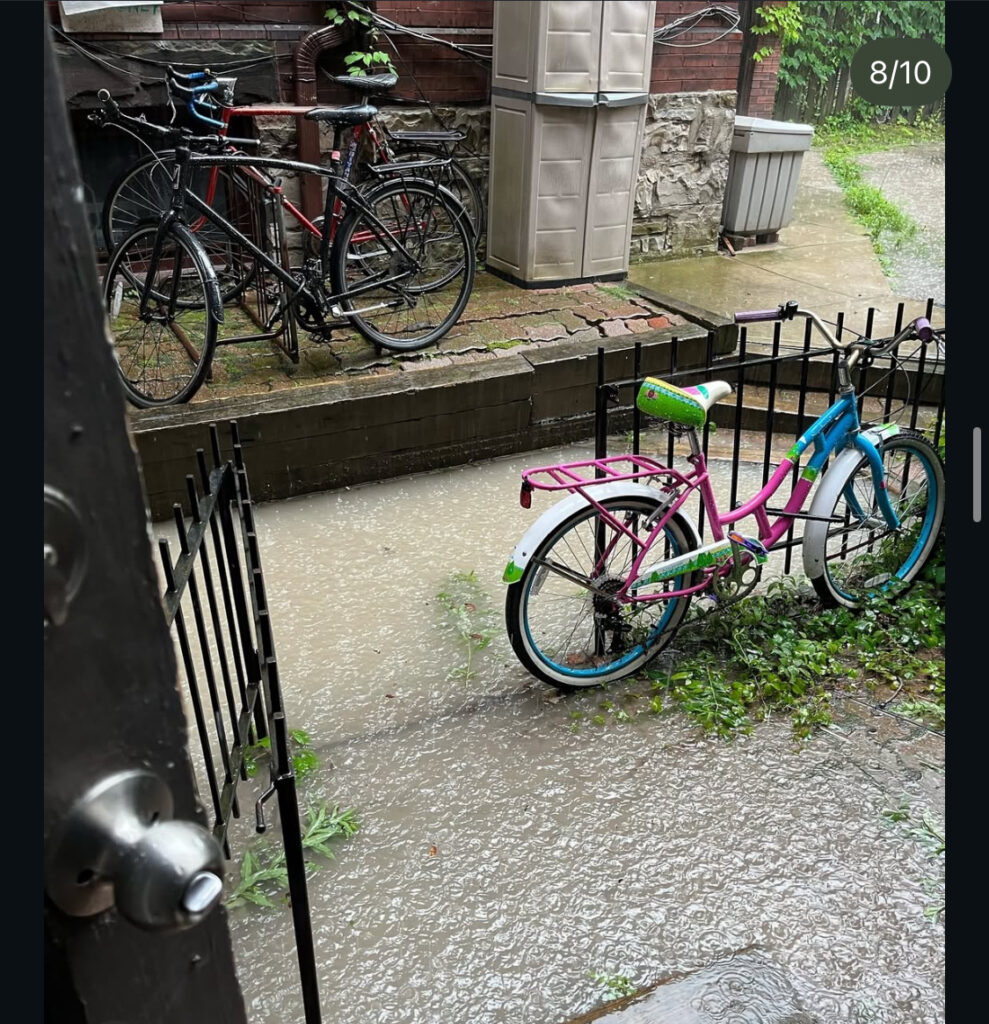
Experts say that Toronto’s flood risks are rising quickly, a prediction supported by a recent Statistics Canada report that warns economically dependent individuals are at the greatest risk. Statistics Canada defines economically dependent as anyone with a “reliance on the workforce, government transfers (e.g., social assistance, employment insurance, Old Age Security), along with a high dependency ratio.”
“For the city of Toronto, flooding and extreme heat are going to be your two greatest risks,” said Kathryn Bakos. She is the Managing Director of Finance and Resilience at the Intact Centre on Climate Adaptation, a research facility at the University of Waterloo.
Flooding is the country’s leading natural disaster — more common than tornadoes and wildfires, according to Statistics Canada which also points out that flooding disproportionately impacts low-income and financially disadvantaged individuals. More intense flooding is on the rise, according to the Canadian Climate Institute. Bakos, however, said that Toronto is a “leader in Canada” for their infrastructure initiatives to reduce flooding risks in the city.
The Canadian Climate Institute says research indicates climate change intensifies multiple factors that increase flood risk, such as heavier rainfall and storm surges, which are amplified by a rise in sea levels.
Communities that are most economically dependent “were 1.6 times as likely to experience at least one flood in 2016,” according to the report.
In July 2024, the Greater Toronto Area experienced “devastating flash flooding that led to prolonged power outages and nearly $1 billion in insured damage to personal property,” according to the Insurance Bureau of Canada.
Which is all fine and good, except other experts say recommendations from these various report findings are never read by the people who can make changes.
“What happens after any flooding [is] studies will be commissioned, reports will come out… and then they are just shelved and then never looked at,” said Nirupama Agrawal, professor in the Disaster and Emergency Management Program at York University’s Faculty of Liberty Arts and Professional Studies. “That is the problem. So, we say lessons learned, but lessons are never learned. They are identified, they are listed, and they are just put in a file.”
A month ago, Toronto Mayor Olivia Chow announced expansions to the Basement Flooding Protection Subsidy Program that “offers assistance to Toronto homeowners looking to install flood prevention measures in their homes.” Experts say, however, that the responsibility doesn’t have to exclusively be on the property owner to make those changes.
“People need to understand [that] we do not share information regarding flood risk in communities for a variety of reasons,” said Agrawal. “One being the real estate value… This information cannot be put out there in the public, because it’s gonna affect the value of the property.”
“If you have no insurance in place, you’re on the line for everything,” said Bakos. “Homeowners need $54,000 — average — in liquid cash within one or two days.”
She said 50 per cent of Canadians live paycheck to paycheck. “If you’re a homeowner… a one-time flood event could disproportionately impact you if you’re a low-income household.”
Other initiatives are “bringing back some natural infrastructure,” according to Bakos. These include ones from the Toronto and Region Conservation Authority, like the Don Mouth Naturalization and Port Lands Flood Protection Project.
“The Intact Centre is currently investigating how flooding impacts mental-health strain, including potential implications for life and health insurance claims,” said Bakos.
Rae Johnston-Black was one of those Torontonians who experienced first-hand the impacts of the summer downpour of July 2024. Her basement unit was filled “ankle-deep” with water. A week later, it happened again.
“We couldn’t live our lives without worrying all the time about whether or not our house was going to flood again,” the recent University of Toronto graduate told OTR.
Johnston-Black’s roommate also lost her sketchbooks in the flooding. “Obviously, you can’t put a price on that,” she said.
Photos Johnston-Black provided show a pool of water around the house, with the bicycle showing the depth.
Clipto.ai and Otter.ai were used to generate interview transcripts. ChatGPT was used as a search engine to find experts, like Nirupama Agrawal, and details supporting quotes, like the Don Mouth Naturalization and Port Lands Flood Protection Project.


